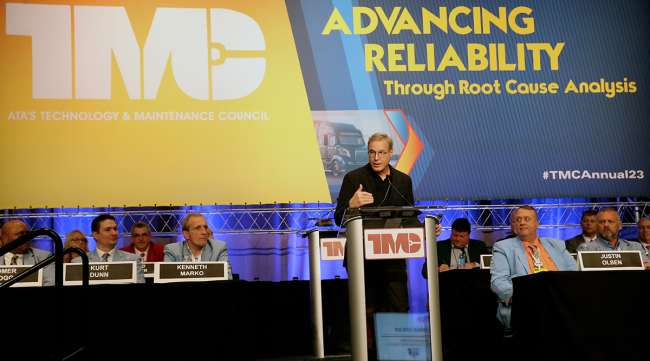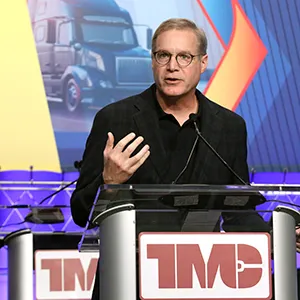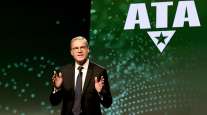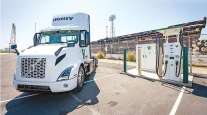Senior Reporter
ATA’s Spear Highlights New FHWA Memo, Emissions

[Stay on top of transportation news: Get TTNews in your inbox.]
ORLANDO, Fla. — American Trucking Associations President Chris Spear touted new federal policy guidance for how states might allocate infrastructure funding during a Feb. 27 address at the Technology & Maintenance Council Annual Meeting and Transportation Technology Exhibition.
Spear discussed guidance from the Federal Highway Administration that was updated in February. The agency has a role in overseeing funds approved in 2021’s Infrastructure Investment and Jobs Act
The update came about a month after ATA and other freight stakeholders pushed back on the agency’s previous guidance, which suggested state agencies prioritize existing infrastructure projects.
Spear stressed that ATA’s role in communicating trucking industry concerns to FHWA was about “reminding them that new infrastructure, as well as fixing existing roads and bridges – there’s plenty of money in this bill for both.”
The new memorandum from FHWA, issued Feb. 24, emphasizes state agencies’ decision-making role about funding linked to infrastructure projects. Of the prior memo, Spear observed: “The [U.S. Department of Transportation] pulled that memo – pulled that memo – re-establishing full funding for existing and new infrastructure.”
Testifying before the U.S. House Transportation and Infrastructure Committee earlier in February, Spear emphasized that the effect of FHWA’s 2021 memo — which he characterized as “don’t bother with the new, focus on the old” — would have led to “really nice roads and bridges, and we’re still sitting on them going nowhere.”
Asserting his stance in that testimony that new infrastructure is needed, Spear said, “We need truck lanes. We need parking. We need new bridges. We need more capacity to move the freight.”

Spear also cautioned against an overly aggressive timeline for converting to electric trucks without charging infrastructure in place. (John Sommers II for Transport Topics)
In a Jan. 18 letter, ATA and nearly two dozen stakeholders called on FHWA to withdraw the 2021 memo. “As transportation stakeholders, we are concerned about the precedent that this policy memo sets. We fear the potential policies that future administrations could prioritize without undertaking a formal notice and comment rulemaking,” the letter said. ATA, the U.S. Chamber of Commerce, the Association of American Railroads and other groups signed the letter.
Congressional Republicans who were critical of the earlier memo also touted FHWA’s update.
“Today is a win for states, communities and millions of Americans who stand to benefit from the flexibility provided in the Infrastructure Investment and Jobs Act,” Rep. Sam Graves (R-Mo.) and Sen. Shelley Moore Capito (R-W.Va.) said in a joint statement Feb. 24. Graves and Capito are chairman of the House transportation panel and ranking member of the Senate committee on highways, respectively.
In the new memo from FHWA Administrator Shailen Bhatt, titled, “UPDATE: Policy on Using Bipartisan Infrastructure Law Resources to Build a Better America,” the agency said, “States determine which of their projects shall be federally financed by federal aid highway formula dollars. Different states have different needs when it comes to transportation assets that must be reconfigured and modernized, expanded and added, or retired and replaced.”
During his TMC address, Spear also addressed proposals in California meant to set state-specific standards for the commercial transportation sector. The California Air Resources Board is seeking a zero-emission trucking landscape in the next decade.
If allowed to advance without context and input from all corners of the transportation sector, the proposed West Coast timelines for emission reductions will establish far-reaching negative effects on industries as well as the freight supply chain, Spear warned. The trucking industry is addressing emissions, he said, but “just not on the timeline that California thinks it’s possible.”
He specifically cited efforts related to adoption of electric vehicles. “Where is the infrastructure to charge these vehicles?” Spear asked. “Where is the power that’s going to have to flow through that infrastructure to power these vehicles?”
Want more news? Listen to today's daily briefing below or go here for more info:


&uuid=(email))



